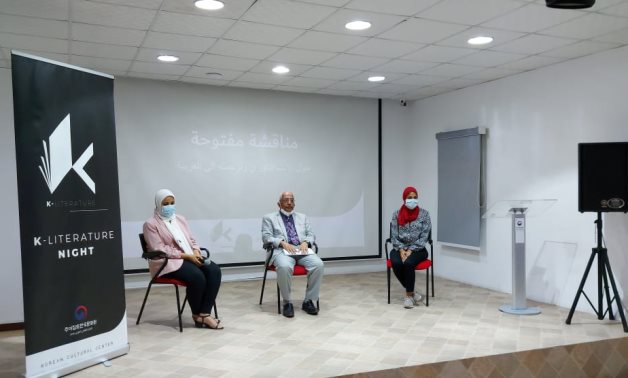
he Korean Cultural Center hosted a literary evening entitled "K-Literature Night"- press photo
CAIRO - 29 July 2021: The Korean Cultural Center hosted a literary evening entitled "K-Literature Night" to wrap up the Korean Literature Month event which continued throughout July.
The evening was attended by poet and writer Ahmed Fadl Shablul and the poet Ashraf Abu Al-Yazid and Dr. Alaa Fathi, a professor of Korean literature at Ain Shams University, as well as young novelist Nahla Karam.
Oh Sung ho, Director of the Korean Cultural Center, said he is pleased to organize the event which attended by a gathering of translators and publishers interested in Korean literature.
The Director of the Korean Cultural Center called for activating the translation between Korean and Arabic languages in order to build bridges of communication and cooperation between the Egyptian and Korean peoples.
Dr. Alaa Fathi said the translation of Korean literature into Arabic began in 2004. Initially, most of the translated works focused on short stories that dealt with the Japanese colonial rule of the Korean peninsula. Recently the trend changed and translation works focused on contemporary literature, particularly works that gained international popularity and literary awards.
In her speech, she elaborated on the stages of the of Korean literature development, from classical literature to contemporary literature and the most important literary works that have not yet translated in to Arabic.
She noted that Korean literature have been gaining recognition worldwide, with notable works including Shin Kyung-sook’s Please Look After Mother, Han Kang’s The Vegetarian and Cho Nam-joo’s Kim Jiyoung, Born 1982.
Poet Ahmed Fadl Shablul said that although we didn’t have inadequate knowledge about modern Korean literature, but the Korean literary works that have been translated into Arabic reveal lofty humanitarian literature, which keep path with modern techniques in the world of short and long stories.
He also expressed the hope that the Korean Literature Translation Institute, in collaboration with the National Translation Centre in Egypt, would play an active role in order to strengthen the translation movement as well as assisting translators and publishing houses so that we could read more Korean literary works in the near future.
The participants agreed that there was an urgent need to adopt an integrated translation strategy between Korean and Arabic languages to promote cultural exchange between Korea and the Arab world.
Comments
Leave a Comment